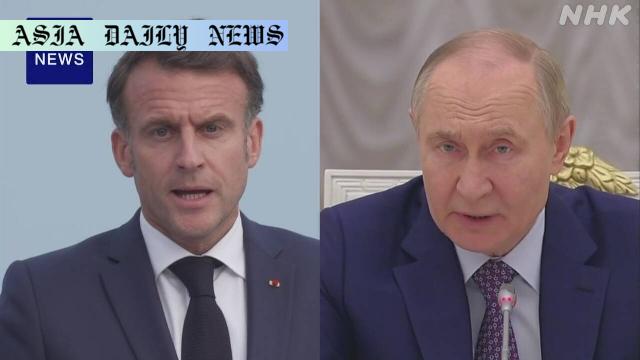Ukraine Conflict: Putin and Macron divided as they discuss the war in Ukraine, sovereignty issues, and potential ceasefire solutions.
- Putin and Macron spoke for the first time in three years to address the Ukraine conflict.
- Putin accuses Western policies of instigating the war in Ukraine.
- Macron reiterates France’s unwavering support for Ukraine’s sovereignty and territorial integrity.
- Putin demands recognition of territorial changes and Ukraine’s withdrawal from pursuing NATO membership.
- Both leaders discussed steps towards a ceasefire and a negotiated peace settlement.

Background on the Ukraine Conflict
The war in Ukraine remains one of the most contentious and devastating conflicts in recent European history, and the tension has escalated over the years due to geopolitical intricacies. French President Emmanuel Macron and Russian President Vladimir Putin recently held a significant telephonic conversation after nearly three years during which the conflict was among the central topics discussed. This dialogue, seen as a potential step forward in brokering peace, highlighted the profound ideological, territorial, and strategic divides between the two leaders.
Putin, advocating for Russia’s stance, reiterated that the root causes of the war stemmed from what Moscow perceives as aggressive Western policies. He argued that the West systematically ignored Russia’s security concerns while fostering Ukraine’s anti-Russian positioning. Meanwhile, Macron maintained his firm support for Ukraine, underlining France’s commitment to its sovereignty and territorial integrity and emphasizing the need for immediate steps toward a ceasefire.
Putin’s Demands and Macron’s Stance
During the conversation, Putin laid out several demands that he believes are essential in resolving the crisis. Among his primary points was Ukraine’s abandonment of its aspirations to join the North Atlantic Treaty Organization (NATO). He further insisted on the recognition of the new territorial boundaries—territories annexed by Russia during the ongoing conflict. These conditions aim to secure what Putin deems as the elimination of the “root causes” of the crisis. For the Kremlin, these changes represent not only strategic strongholds but also a symbolic justification for their military engagement.
On the other hand, Macron stressed the importance of diplomacy and negotiations while urging a ceasefire to halt further violence. France has consistently supported Ukraine’s right to sovereignty, denouncing Russia’s unilateral annexation of Ukrainian territories. Macron seems committed to finding a pathway for peaceful settlements but without compromising on international law and Ukraine’s territorial rights.
Geopolitical Ramifications
The discussion between Putin and Macron has broader implications not just for Ukraine and Russia, but for Europe and global strategic alliances. Putin continuously seeks to assert Russia’s dominance in the region, often pointing to Western alliances as provocateurs of instability. The current ideological divide is reflective of the ongoing battle for influence between Western democracies and authoritarian powers like Russia. Meanwhile, Europe faces the burden of navigating this crisis to ensure regional security and stability.
Macron, as a prominent European leader, plays a pivotal role in mediating potential peace solutions. His call for negotiations offers a glimmer of hope amidst the deep-seated tensions. However, the varying perspectives on “new territorial realities” and sovereignty remain substantial barriers to progress.
Conclusion: Pathways to Peace
The interaction between Putin and Macron, though far from resolving the crisis, demonstrates the ongoing attempts at diplomacy amidst a volatile situation. Both leaders highlight critical visions for combating the crisis—one prioritizing territorial recognition and strategic dominance, and the other emphasizing sovereignty, ceasefire, and negotiations. It is evident that the pathway to peace will require significant compromises, a balance between legitimacy and strategic interests, and extensive dialogue from all key stakeholders.



Commentary
The Importance of Diplomatic Engagement amidst Conflict
The recent conversation between Putin and Macron encapsulates the dire need for open channels of communication, particularly in times of heightened conflict. It is a reminder that, even amidst deep-seated divisions, dialogue can serve as a critical tool for at least outlining the potential roadmaps for peace. Leaders engaging in such discussions carry the responsibility of exploring all viable options that ensure stability without compromising fundamental values such as sovereignty and international law.
The Challenges of Bridging Ideological Divides
However, the conversation between the two leaders also underscores the monumental challenge of aligning ideologically opposite perspectives. On the one hand, there is Russia’s pursuit of strategic security and regional dominance, often expressed through territorial assertions. On the other hand, Western nations and Ukraine staunchly defend the principles of sovereignty and the inviolability of territorial integrity. Striking a balance that addresses both sides’ concerns will undoubtedly require compromise, which, in this case, appears difficult to achieve given the firm stances.
Hope for Progress or a Stalemate?
While such engagements offer hope, the lack of concrete agreements or even consideration of mutual concessions leaves uncertainties about the path ahead. Macron’s efforts to emphasize a ceasefire and negotiations are admirable, reflecting a vision of conflict resolution rooted in peaceful diplomacy. Yet, with Putin’s unwavering demands, including NATO withdrawal and recognition of territorial changes, the prospects of reconciliation remain murky. It is evident that political will and international cooperation will play a decisive role in shaping the future of Ukraine and the broader region.
The global community must continue to pressure all parties to engage constructively, prioritizing humanitarian needs and long-term stability over territorial ambitions and geopolitical rivalries. Maintaining hope and fostering dialogue amidst such divisions is, in itself, a significant act of resilience and leadership.